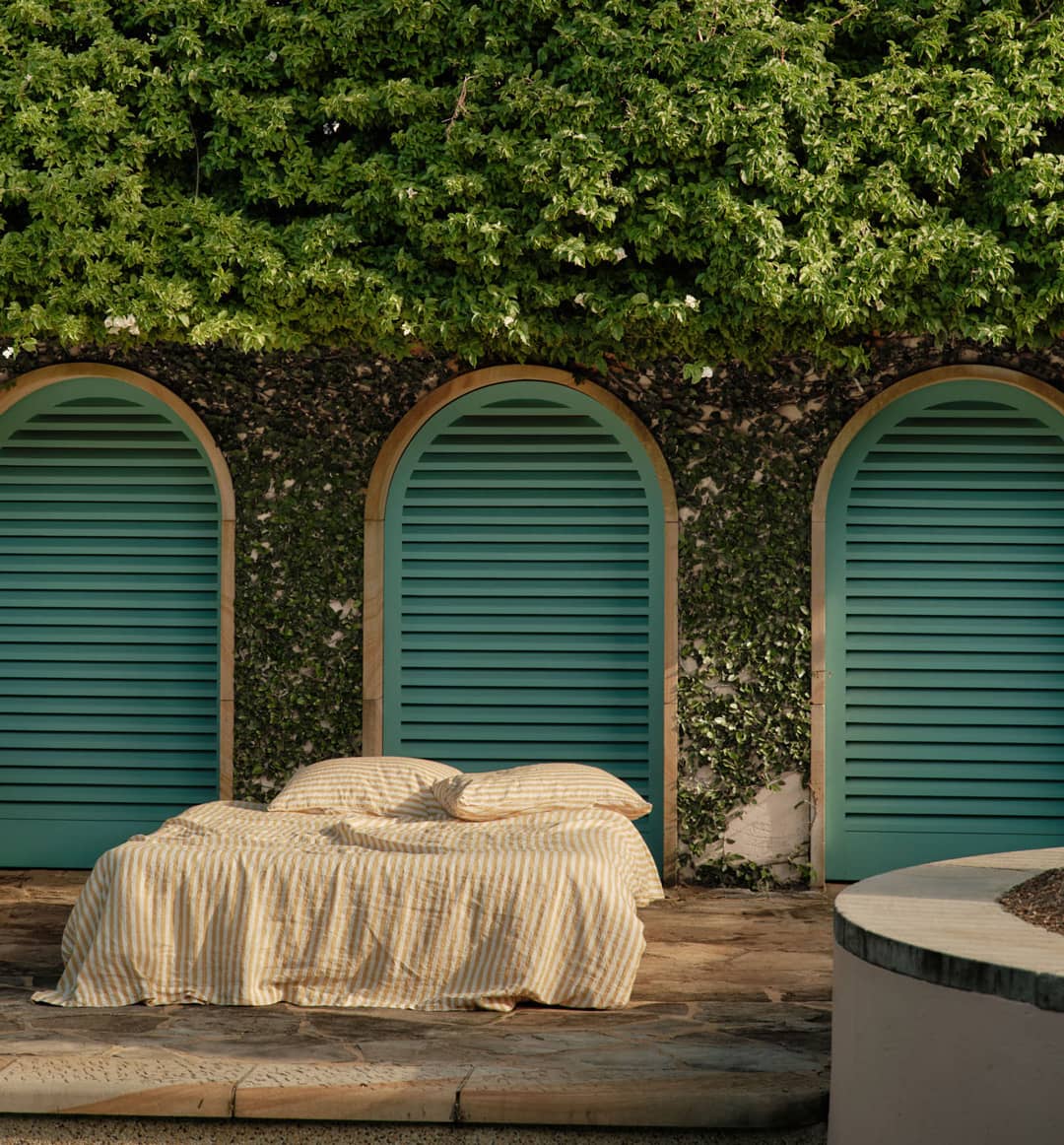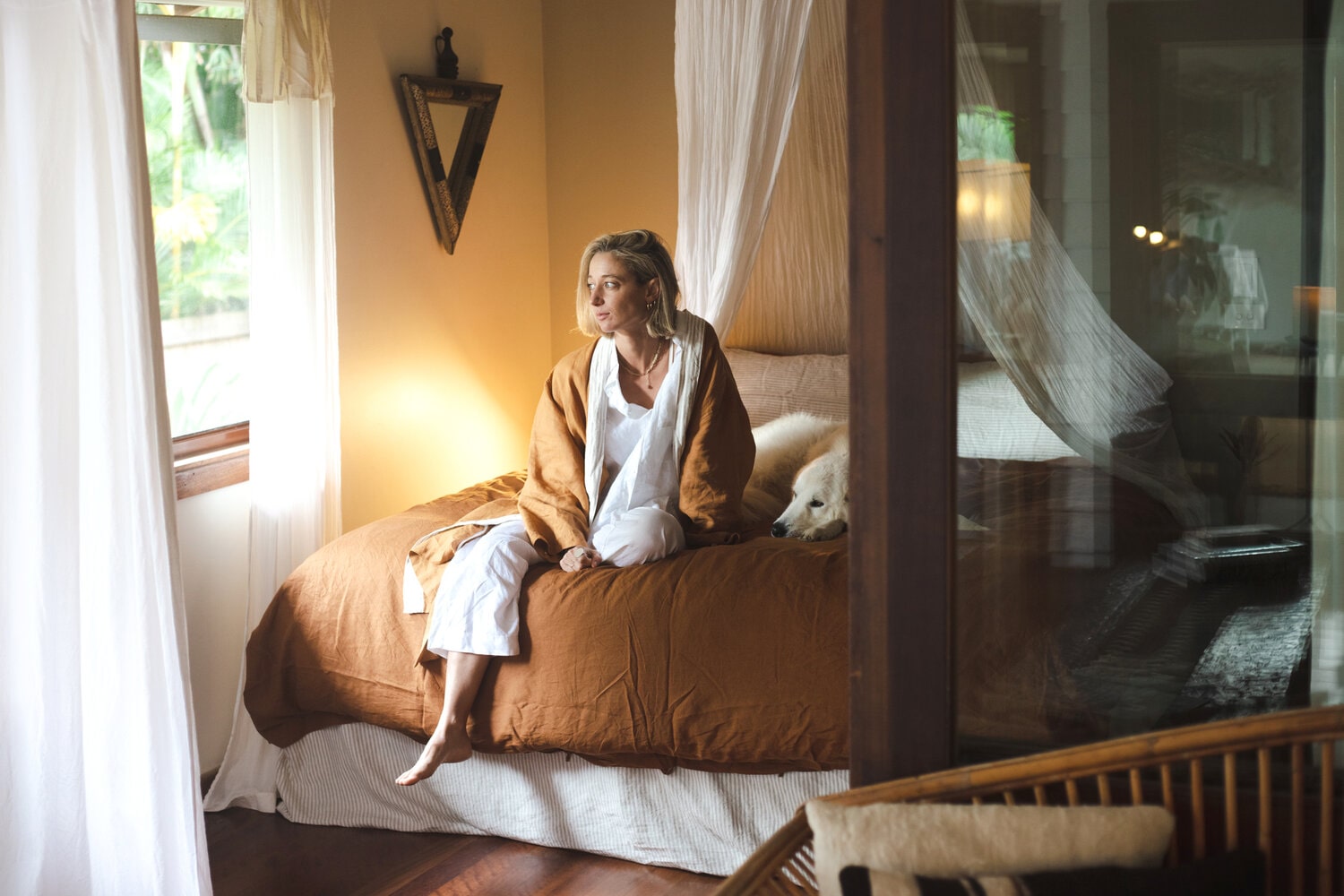A Love For Linen
Written by: Nina Karnikowski
Images by: Peter Windrim

Nina Karnikowski in her Byron Bay bedroom. Featuring our Linen Duvet Cover in Tobacco, Linen Sheet Set in Natural Stripes, Linen Shirt in White and Linen Pants in White
Seven years ago, my mum gave me a luscious linen bedsheet as a birthday gift. A deep, rich olive colour, with a rustic texture that was cool to the touch, it felt luxurious. And, despite the fact that I was already 31, like a kind of invitation into genuine adulthood.
Those first few nights spent wrapped up in that sheet, I was amazed at how something as simple as a better bedsheet could make me feel so good. I vowed never to buy cotton sheets again, and a few years later found our linen closet, wardrobe and pantry filling with linen. Not only because it continued to make me feel grounded and calm, but also because it aligned with my growing passion for sustainability.
This passion reached its peak in 2019, when I visited the Arctic on a travel writing assignment, and properly grasped the damaging effects our consumptive behaviours, including the way we shop, were having on the polar bears, and the natural world at large.
Following that trip, I committed to doing as much as possible to lighten my environmental footprint. Choosing organic linen over other fabrics has been part of that process, since I’ve discovered it to be one of the most low impact fabrics on Earth.


Linen Duvet Cover in Tobacco, Linen Sheet Set in Natural Stripes, Linen Pillowcase Set in Tobacco, Linen Shirt in White and Linen Pants in White
Made from the fibres of the beautiful indigo-flowered flax plant, nothing goes to waste when flax is picked to produce linen. The plant’s bioroducts, including flaxseeds, flaxseed oil, straw and lower-quality fibres, are used to produce everything from food, medicine and soap, to cattle feed, paper and insulation.
This sustainable plant becomes even more so when it’s grown and produced in a responsible and ethical way, as Carlotta & Gee ensures it is, by using flax grown without chemicals in Normandy in northern France. Carlotta & Gee have international OEKO-TEX certification, meaning their premium fabric is tested to make sure no harmful substances are used before it’s sent to them, as well as the Global Organic Textile Standard (GOTS), the world’s leading processing standard for textiles made from organic fibres.
Linen is also more durable than most other fabrications, thanks to the strong and robust flax fibres. It’s 30 percent thicker and stronger than cotton, and because it’s resilient and can grow in poor-quality soil, it also uses far less water than cotton and next to no fertilisers. It’s also more UV resistant so it won’t fade as quickly, and moths don’t like it – both factors that mean linen lasts longer. Because linen becomes softer and more pliable the more it’s worn and washed (Carlotta & Gee pre-wash their creations with volcanic stones for enhanced softness) it improves with age, meaning pieces can be handed down as heirlooms through the generations.


Linen Robe in Clay, Linen Shirt in White and Linen Pants in White
Used since 8000BC, linen is one of the world’s oldest fibres. It’s so sturdy that when the tomb of Ramesses II, one of the greatest Egyptian pharaohs, was unearthed after 3,000 years, the linen he was mummified in was said to have been almost perfectly preserved.
Whether using a napkin or apron in the kitchen, throwing a tablecloth over the dining table, lounging in pyjamas or relaxing in bed, linen feels light and airy against the skin. Because it’s moisture-wicking and naturally thermoregulating, keeping you cool in summer and cosy in winter, I’ve found that an investment in linen is also an investment in health and sleep quality. Linen contains silica, which is naturally antibacterial and great for sensitive skin, and its irregular fibre bundles and looser weave give it an earthy, calming texture that I find helps you drift off to sleep more easily.
So will switching to linen save the planet? Well, no – I don’t believe any purchasing decision, when looked at in isolation, will. But every small shift we make in our lives towards sustainability leads to bigger shifts, which eventually does lead to changing the world.
Nina Karnikowski’s latest book is, Go Lightly: How to Travel Without Hurting the Planet.



